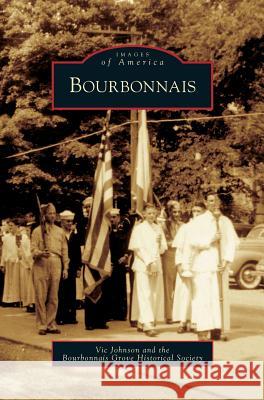Bourbonnais » książka
Bourbonnais
ISBN-13: 9781531624651 / Angielski / Twarda / 2006 / 130 str.
The village name Bourbonnais is attributed to Fran ois Bourbonnais. He was a 19th-century French Canadian fur trader who maintained a post in a grove of trees along the east bank of the Kankakee River. This location became known as Bourbonnais Grove. Noel LeVasseur, a former American Fur Company employee, bought two sections of land in the grove in 1834 and established a settlement of immigrant French Canadians. At first, the village was called variously La Point, La Ville, and Vasseurville. A post office named Bourbonnais Grove opened in 1838. The village was known as Bourbonnais Grove until 1875, when it was incorporated as Bourbonnais. By the 1860s, Bourbonnais Grove had 1,719 inhabitants, a blacksmith shop, livery stable, hotel, and a new church dedicated to the Blessed Virgin Mary of the Nativity and built of native limestone. The images in this book depicting life in Bourbonnais have been gathered from local private and museum collections."
The village name Bourbonnais is attributed to Fran ois Bourbonnais. He was a 19th-century French Canadian fur trader who maintained a post in a grove of trees along the east bank of the Kankakee River. This location became known as Bourbonnais Grove. Noel LeVasseur, a former American Fur Company employee, bought two sections of land in the grove in 1834 and established a settlement of immigrant French Canadians. At first, the village was called variously La Point, La Ville, and Vasseurville. A post office named Bourbonnais Grove opened in 1838. The village was known as Bourbonnais Grove until 1875, when it was incorporated as Bourbonnais. By the 1860s, Bourbonnais Grove had 1,719 inhabitants, a blacksmith shop, livery stable, hotel, and a new church dedicated to the Blessed Virgin Mary of the Nativity and built of native limestone. The images in this book depicting life in Bourbonnais have been gathered from local private and museum collections."











